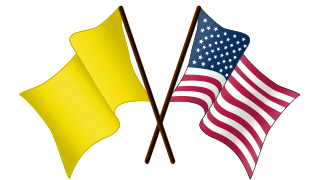
Property is a system of rights that gives people legal control of valuable things, and also refers to the valuable things themselves. Depending on the nature of the property, an owner of property may have the right to consume, alter, share, redefine, rent, mortgage, pawn, sell, exchange, transfer, give away, or destroy it, or to exclude others from doing these things, as well as to perhaps abandon it; whereas regardless of the nature of the property, the owner thereof has the right to properly use it under the granted property rights.
Personal property is property that is movable. In common law systems, personal property may also be called chattels or personalty. In civil law systems, personal property is often called movable property or movables—any property that can be moved from one location to another.
Private property is a legal designation for the ownership of property by non-governmental legal entities. Private property is distinguishable from public property, which is owned by a state entity, and from collective or cooperative property, which is owned by one or more non-governmental entities. John Locke described private property as a Natural Law principle arguing that when a person mixes their labor with nature, the labor enters the object conferring individual ownership.
A mortgage is a legal instrument of the common law which is used to create a security interest in real property held by a lender as a security for a debt, usually a mortgage loan. Hypothec is the corresponding term in civil law jurisdictions, albeit with a wider sense, as it also covers non-possessory lien.
Critical legal studies (CLS) is a school of critical theory that developed in the United States during the 1970s. CLS adherents claim that laws are devised to maintain the status quo of society and thereby codify its biases against marginalized groups.

Libertarian theories of law build upon classical liberal and individualist doctrines.

Law and economics, or economic analysis of law, is the application of microeconomic theory to the analysis of law. The field emerged in the United States during the early 1960s, primarily from the work of scholars from the Chicago school of economics such as Aaron Director, George Stigler, and Ronald Coase. The field uses economics concepts to explain the effects of laws, to assess which legal rules are economically efficient, and to predict which legal rules will be promulgated. There are two major branches of law and economics; one based on the application of the methods and theories of neoclassical economics to the positive and normative analysis of the law, and a second branch which focuses on an institutional analysis of law and legal institutions, with a broader focus on economic, political, and social outcomes, and overlapping with analyses of the institutions of politics and governance.

Intimidation is a behaviour and legal wrong which usually involves deterring or coercing an individual by threat of violence. It is in various jurisdictions a crime and a civil wrong (tort). Intimidation is similar to menacing, coercion, terrorizing and assault in the traditional sense.

Gary Lawrence Francione is an American academic in the fields of law and philosophy. He is Board of Governors Professor of Law and Katzenbach Scholar of Law and Philosophy at Rutgers University in New Jersey. He is also a visiting professor of philosophy at the University of Lincoln (UK) and honorary professor of philosophy at the University of East Anglia (UK). He is the author of numerous books and articles on animal ethics.
In property law, a concurrent estate or co-tenancy is any of various ways in which property is owned by more than one person at a time. If more than one person owns the same property, they are commonly referred to as co-owners. Legal terminology for co-owners of real estate is either co-tenants or joint tenants, with the latter phrase signifying a right of survivorship. Most common law jurisdictions recognize tenancies in common and joint tenancies.

The sovereign citizen movement is a loose group of anti-government activists, litigants, tax protesters, financial scammers, and conspiracy theorists based mainly in the United States. Sovereign citizens have their own pseudolegal belief system based on misinterpretations of common law and claim to not be subject to any government statutes unless they consent to them. The movement appeared in the United States in the early 1970s and has since expanded to other countries; the similar freeman on the land movement emerged during the 2000s in Canada before spreading to other Commonwealth countries such as Australia, New Zealand and the United Kingdom. The FBI describes sovereign citizens as "anti-government extremists who believe that even though they physically reside in this country, they are separate or 'sovereign' from the United States".
The right to property, or the right to own property, is often classified as a human right for natural persons regarding their possessions. A general recognition of a right to private property is found more rarely and is typically heavily constrained insofar as property is owned by legal persons and where it is used for production rather than consumption. The Fourth Amendment to the United States Constitution is credited as a significant precedent for the legal protection of individual property rights.
The law of Germany, that being the modern German legal system, is a system of civil law which is founded on the principles laid out by the Basic Law for the Federal Republic of Germany, though many of the most important laws, for example most regulations of the civil code were developed prior to the 1949 constitution. It is composed of public law, which regulates the relations between a citizen/person and the state or two bodies of the state, and the private law, (Privatrecht) which regulates the relations between two people or companies. It has been subject to a wide array of influences from Roman law, such as the Justinian Code the Corpus Juris Civilis, and a to a lesser extent the Napoleonic Code.
A straw man is a form of argument and an informal fallacy.
A straw owner is a person who owns property legally or has the legal appearance of owning something but does so on behalf of another, sometimes for a fee, and typically solely to hide the identity of the effective owner. Most instances of straw ownership are legal, but the arrangement is sometimes made for nefarious, illegal purposes.
The philosophy of copyright considers philosophical issues linked to copyright policy, and other jurisprudential problems that arise in legal systems' interpretation and application of copyright law.

Law is a set of rules that are created and are enforceable by social or governmental institutions to regulate behavior, with its precise definition a matter of longstanding debate. It has been variously described as a science and as the art of justice. State-enforced laws can be made by a group legislature or by a single legislator, resulting in statutes; by the executive through decrees and regulations; or established by judges through precedent, usually in common law jurisdictions. Private individuals may create legally binding contracts, including arbitration agreements that adopt alternative ways of resolving disputes to standard court litigation. The creation of laws themselves may be influenced by a constitution, written or tacit, and the rights encoded therein. The law shapes politics, economics, history and society in various ways and also serves as a mediator of relations between people.
The "first possession" theory of property holds that ownership of something is justified simply by someone seizing it before someone else does. This contrasts with the labor theory of property where something may become property only by applying productive labor to it, i.e. by making something out of the materials of nature.
This is an index of articles in jurisprudence.

The strawman theory is a pseudolegal conspiracy theory originating in the redemption/A4V movement and prevalent in antigovernment and tax protester movements such as sovereign citizens and freemen on the land. The theory holds that an individual has two personas, one of flesh and blood and the other a separate legal personality and that one's legal responsibilities belong to the strawman rather than the physical individual.







